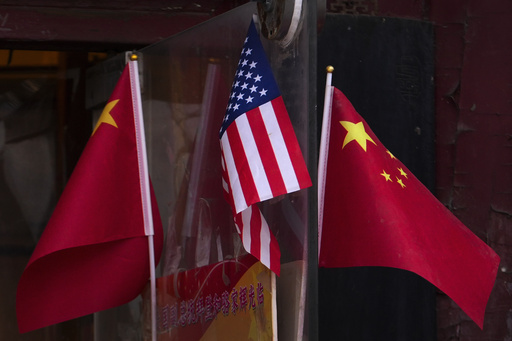BEIJING — In response to tariffs imposed by President Donald Trump on Chinese goods, China has retaliated by implementing its own tariffs on various U.S. imports as well as initiating an antitrust investigation into Google, alongside other trade measures.
The U.S. tariffs affecting products from Canada and Mexico also went into effect today. However, Trump has granted a 30-day reprieve to these countries as they have begun addressing his concerns regarding border security and drug trafficking. He is anticipated to have discussions with Chinese President Xi Jinping in the coming days.
This most recent development marks yet another round of reciprocal actions between the two nations. The two countries were embroiled in a trade conflict back in 2018 when Trump elevated tariffs on Chinese imports, prompting a similar response from China.
Analysts suggest that China is now better equipped to respond to U.S. tariffs. Philip Luck, a former State Department official and director at the Center for Strategic and International Studies, emphasized at a recent forum that China has developed a more sophisticated export control system. He noted that the U.S. relies on China for numerous essential minerals such as gallium and germanium, indicating that China holds significant leverage that could impact the American economy adversely.
The new tariffs announced today target multiple economic sectors, affecting everything from energy to various U.S. companies. China is set to impose a 15% tariff on coal and liquefied natural gas (LNG) products, in addition to a 10% tariff on crude oil, agricultural machinery, and large-engine vehicles imported from the U.S. These tariffs are scheduled to take effect next Monday.
The State Council Tariff Commission released a statement asserting that the U.S.’s unilateral increase in tariffs violates World Trade Organization regulations. They claimed that such measures not only fail to resolve U.S. issues but also harm the normal economic and trade partnership between the two nations.
China is the leading global buyer of liquefied natural gas, chiefly sourcing from Australia, Qatar, and Malaysia. Notably, the U.S., the top exporter of LNG in the world, has been relatively minor in LNG sales to China. In 2023, the U.S. shipped approximately 173,247 million cubic feet of LNG to China, accounting for just about 2.3% of total U.S. natural gas exports, per reports from the U.S. Energy Information Administration.
To add to the trade tensions, China announced export limitations on several crucial minerals used in the manufacturing of modern technology. These minerals, which include tungsten, tellurium, bismuth, molybdenum, and indium, are categorized as critical by the U.S. Geological Survey and are vital to U.S. economic and national security, often found in fragile supply chains. These new controls follow a previous set imposed in December targeting important elements like gallium.
On the corporate front, China’s State Administration for Market Regulation is investigating Google for alleged antitrust violations, an announcement made shortly after Trump’s 10% tariffs on Chinese products were enforced. The impact of this investigation on Google’s operations remains uncertain. Given that Google’s search engine is blocked in China, the company’s interaction with the market has been limited since it exited the country in 2010, following censorship disputes.
Moreover, two American firms have been placed on China’s unreliable entities list, which complicates their operations in China. These companies include PVH Group, known for brands such as Calvin Klein and Tommy Hilfiger, and Illumina, a biotechnology firm. Being on this list prevents them from participating in import or export activities related to China and restricts new investments there. PVH has been under scrutiny since last September over its alleged refusal to use Xinjiang cotton.
Experts believe China’s responses are strategic, yet the global economic community is wary of the broader implications. Stephen Dover, chief market strategist at the Franklin Templeton Institute, warned that this might be the onset of a trade warfare that could lead to diminished GDP growth across nations, increased inflation in the U.S., and heightened pressure on interest rates.




